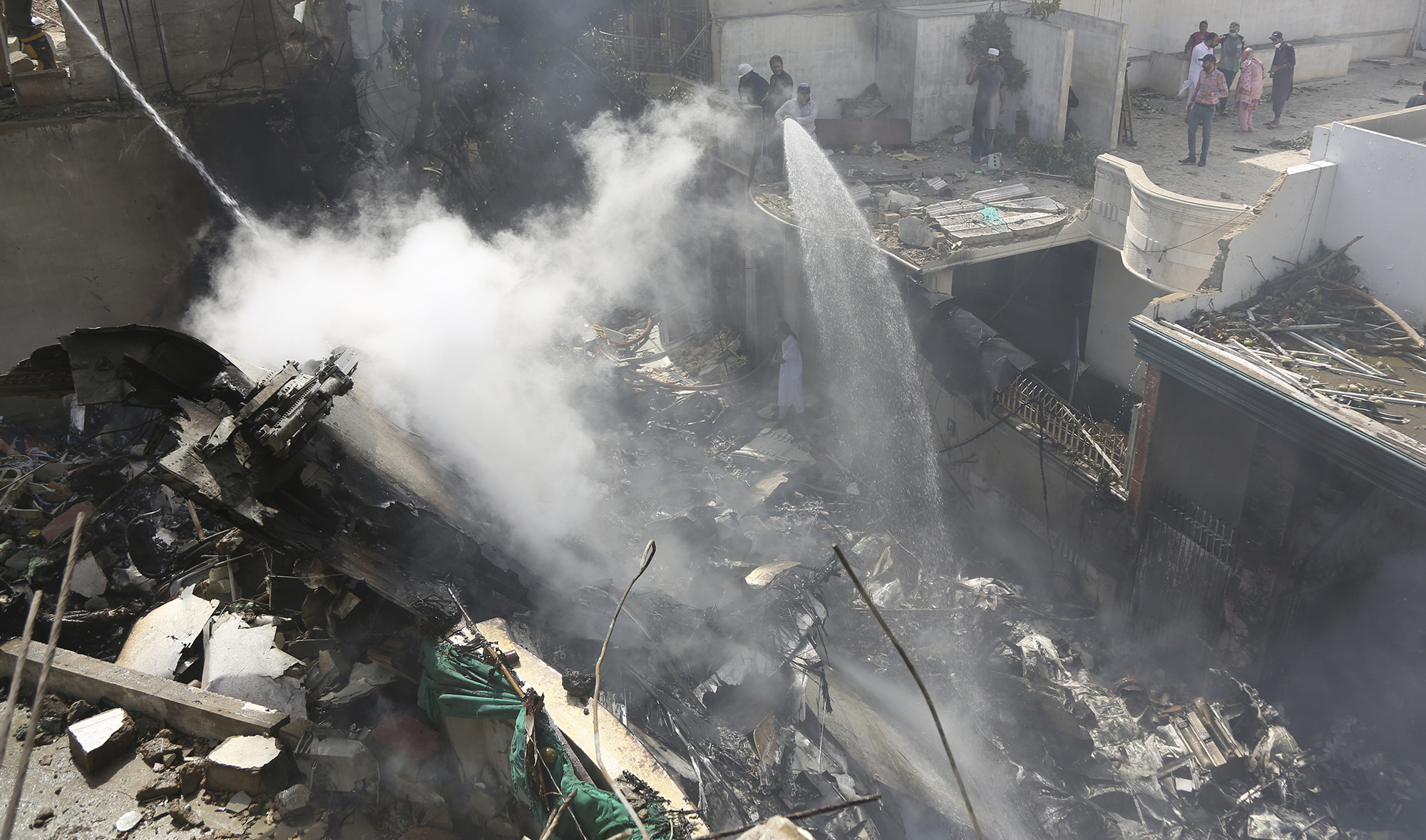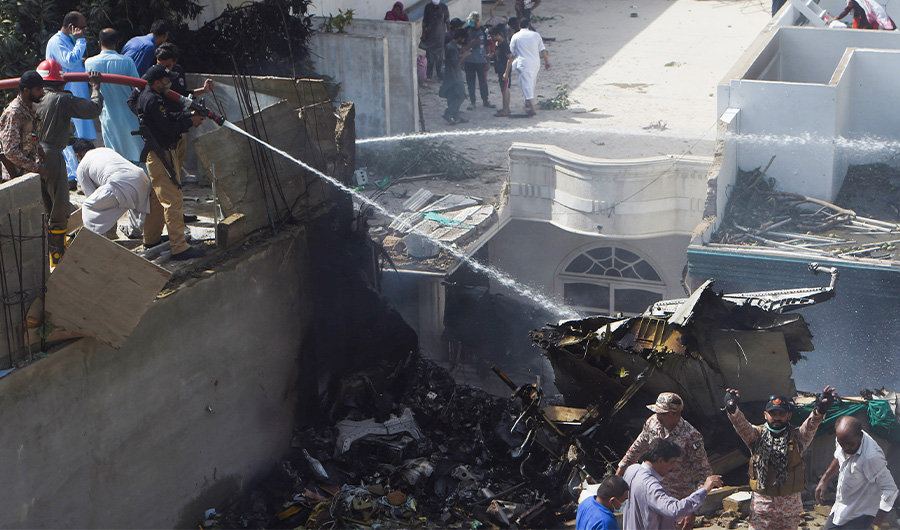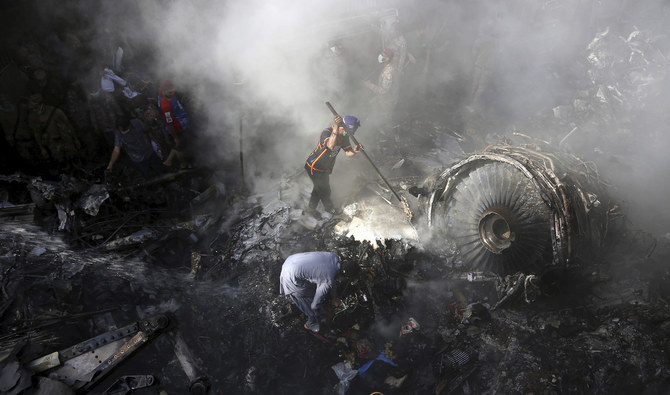ISLAMABAD/KARACHI: Pakistan’s federal government has constituted a team to investigate Friday’s crash of a Pakistan International Airlines (PIA) flight, a spokesperson for the Aviation Division said, as the provincial health department confirmed 66 deaths.
The 16-year-old A320 Airbus was flying from Lahore city to Pakistan’s financial hub of Karachi, the capital of Sindh province, when it crashed in a residential area near the airport.
In a text message sent to Arab News, Meeran Yousuf, the provincial health minister’s spokesperson wrote: “66 deaths confirmed. 2 survivors,” adding that 41 bodies had been taken to Jinnah Postgraduate Medical Center and 25 to Civil Hospital Karachi.
Hospital and rescue officials could not confirm if the dead and injured people being brought to hospitals were all passengers or residents of the buildings the plane had crashed into.
A notification from the Aviation Division seen by Arab News said an investigation team formed by the federal government would furnish a preliminary statement within a month and a full report in the “shortest possible time.”
Ghulam Rasool Khosa, a spokesman for the Civil Aviation Authority, told Arab News two people had survived the jet crash but declined further details. Athar Awan, a spokesman for PIA, said it was too early to comment on the number of survivors until rescue operations were over.
“Those injured on board and due to crash went to different hospitals so it is hard to identify who is a surviving passenger,” Saeed Ghani, a senior minister in the Sindh cabinet, told Arab News. “But two people who we could talk to [and who are alive] have confirmed to us that they were on board.”

Fire brigade staff try to put out fire caused by plane crash in Karachi on May 22, 2020. (AP)
Pakistan resumed domestic flights just this week after shutting them down in March amid the coronavirus pandemic.
“The plane … took off from Lahore airport at 1.00 p.m. and approached Karachi airport at the scheduled time,” Abdul Sattar Khokhar, senior joint secretary at the Aviation Division, told Arab News. “The pilot made a mayday call at 2.39 p.m. and the plane crashed at the same time in a residential area close to the airport.”
Khokhar said it would be “premature” to comment on the reasons that caused the jet to crash but said a committee headed by Air Commodore Usman Ghani had been set up to investigate the matter.
Pakistan Prime Minister issued a Twitter statement expressing condolences to the families of those who died, saying: “Shocked & saddened by the PIA crash. Am in touch with PIA CEO Arshad Malik, who has left for Karachi & with the rescue & relief teams on ground as this is the priority right now. Immediate inquiry will be instituted.”
Rescue officials said they initially faced difficulty in reaching the crash site because of the area’s narrow streets and the presence of huge crowds of people who had gathered in the neighborhood. But police officers and soldiers from the Pakistan Army’s Quick Reaction Force and the paramilitary Rangers quickly dispersed crowds and cordoned off the area, allowing rescue officials to fight through thick smoke and flames to find survivors amid the wreckage.
Pakistani news television channels showed damaged buildings and cars at the site of the crash, and charred bodies being pulled out from the mangled fuselage. Firefighters and Edhi Foundation volunteers could be seen hosing down the debris of the plane and surrounding buildings that had caught fire.
Devastated family members mourned and wailed at the airport and near the crash area, trying to find out if their relatives had survived.
Witnesses reported the plane plummeting down, and said its rear end hit the ground first.
Muhammad Adil, a resident of Malir area’s Model Colony, said he was offering Friday prayers at a nearby mosque when he heard a huge blast.
“I ran to the street and saw the plane had crashed after damaging most of the houses,” Adil told Arab News, describing parts of the plane strewn across the neighborhood. “I couldn’t see the injured and the dead as law enforcement agencies pushed us from the area and cordoned it.”
Footage on Pakistan’s Geo News showed rescue officials pulling Zafar Masud, the CEO of the Bank of Punjab, out of the wreckage alive. A spokesperson for Sindh chief minister Murad Ali Shah confirmed that Masud was recovering at a Karachi hospital.
A top Pakistani model, Zara Abid, was also confirmed to be on the flight. Her last post on the popular photo-sharing site Instagram, from three days ago, showed her inside a small plane, with the caption: “Fly high, it’s good.” Arab News was unable to confirm if she had died in the crash or survived.
Pakistan’s Geo News reported that a part of the plane’s black box, the quick access recorder, had been recovered and handed over to Civil Aviation Authority officials. The recorder provides raw flight data and a record of conversations held in the cockpit.
Friday’s air crash brought back memories of the last major plane crash in Pakistan, in 2016, when a plane carrying 47 people crashed into a mountain in northern Pakistan.

Policemen spray water on the part of a Pakistan International Airlines aircraft after it crashed at a residential area in Karachi on May 22, 2020. (AFP)
In 2010, a 10-year-old Airbus A321 operated by the then relatively new Pakistani airline, Airblue, crashed in fog and intense rain in the Himalayan foothills near Islamabad, killing all 152 people on board in the country’s deadliest domestic plane crash.
In July 2006, a Pakistan International Airlines flight crashed shortly after takeoff in the eastern city of Multan, killing all 45 people aboard, including two judges from the Lahore High Court, two brigadier generals of the Pakistani Army and a university vice chancellor.
Right before Friday’s crash, the pilot of the jet sent a Mayday and told controllers the aircraft had lost power from both its engines on its second attempt to land, Reuters reported, quoting monitoring website liveatc.net, a respected source for in-flight recordings.
After the crash, questions and criticism immediately surfaced about the quality and maintenance of the aging airplanes used by PIA, the country’s main carrier.
Senior pilot and spokesman of the Pakistan Airline Pilots Association, Tariq Yahya, said he and his colleagues had feared such an accident was on the cards as many PIA planes had outlived their age.
“In the end it seems there was no power in the plane,” Yahya said. “The plane was gliding along and couldn’t make it to the runway … It crashed very short of the runway, which is so unfortunate.”
To inquire about the plane crash or passenger details, the government has supplied the following phone numbers: 02199242284, 02199043766, 02199043833.
Aamir Saeed contributed reporting from Islamabad












